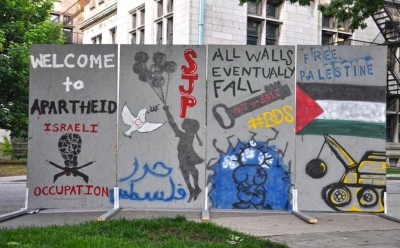by: Oren Segal
October 07, 2016
Several factors suggest that we will see significant levels of anti-Israel campus activity during the 2016-17 school year. While the presidential elections may overshadow anti-Israel activity through early November, the confluence of major conflict-related anniversaries, the trend of increased numbers of anti- Israel events, and the strengthening ties between Black Lives Matter and Palestinian activists are just a few of the elements that are likely to pose challenges for the pro-Israel community on U.S. campuses.
These are the challenges the pro-Israel community on campus can expect to face this year:
- Significant Anniversaries: The 50th anniversary of the Six Day War and the 100th anniversary of the Balfour declaration that will likely bring additional scrutiny to the Israeli-Palestinian conflict. Significant anniversaries have served in the past as an event for anti-Israel groups to rally around. Both of these events are expected to be used by anti-Israel groups as an excuse to criticize Israel and Israeli policies.
- Increased number of anti-Israel events: During the 2014-15 and 2015-16 school years, at least 1,000 anti- Israel events took place on university and college campuses in the U.S., including Boycott, Divestment, and Sanctions (BDS) campaigns. The average of nearly 500 such events per year reflects a 40% increase from the 375 anti-Israel programs on U.S. campuses in 2013-14.
- BDS resolutions: Over the past few years, anti-Israel activists have encouraged student governments or student bodies across the country to vote on Boycott, Divestment and Sanctions resolutions in an effort to further their anti-Israel agenda. While it is important to note that no university administration has ever implemented a divestment policy, the passage of these resolutions, in some cases, has inflamed tensions in the campus community, and has resulted in campus polarization.
- University sponsorship of anti-Israel events: Of the 1,000 anti-Israel events held on campus during the past two school years, at least 77 were sponsored by either a university department or an academic program. The number of university-sponsored events has remained steady over the past two years, but given this year’s anniversaries, and the emergent coalition between pro-Palestinian students and other campus- affiliated groups, an increase in the university-sponsored anti-Israel events seems likely. Such sponsorship creates the perception that the sponsoring university departments sanction the goals and strategies of anti-Israel activists, lending an added degree of legitimacy and credibility to anti-Israel advocacy and campaigns that may alienate Jewish and pro-Israel students.
- Black Lives Matter: Recently, the convergence of pro-Palestinian activists and the Black Lives Matter movement was forcefully illustrated by a Black Lives Matter (BLM) Facebook statement announcing the Movement for Black Lives’ platform, in which Israel is described as an “apartheid state” that commits “genocide” against the Palestinian people. While this sort of linking of social justice issues to anti-Israel activity is hardly a new phenomenon, this latest development is the most recent evidence of a growing interest in “intersectionality.” As explained by Rev. Graylan Hagler of the “from Ferguson to Palestine” campaign, the linkage to intersectionality is based on the theory’s main point that “Throughout history, people who are oppressed do stand in solidarity with others who are oppressed.” These connections were amplified in 2014, the year in which two seemingly unrelated events became linked in the minds of some campus activists: Michael Brown’s death in Ferguson, Missouri and Operation Protective Edge-- Israel’s IDF campaign in Gaza. Intersectionality as a basis for anti-Israel events is clearly on the rise on U.S. college campuses.










